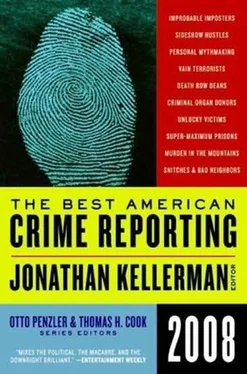When the Grand Manan volunteer fire company arrived, the firefighters figured that they might have to reserve one of their hoses to protect themselves, since they could hear shouts of “Let it burn!” and “Off the island!” Rocks were falling near the firefighting equipment. Eventually, the firefighters were satisfied that the blaze was out and they returned to the fire hall. Ross and some of his friends were escorted away by the R.C.M.P., leaving the house empty. Then, at four-thirty or five in the morning, there were explosions inside the house and it burst into flames. When the firefighters arrived this time, they encountered a pickup truck parked across Cedar Street to bar their entry. After that had been cleared away, the fire trucks were blocked by half a dozen people, including Sara Wormell, linking hands across the road. Sooner or later, the firemen were allowed through, but it was too late. Ronnie Ross’s house was beyond saving.
CANADA WAS STARTLED. T here were headlines across the country about the normally serene fishing community of Grand Manan-in the normally law-abiding country of Canada-having resorted to vigilantism. Crown Prosecutor McAvity moved swiftly to bring charges against those who had broken the law, partly to demonstrate that the authorities were not going to tolerate what he called mob rule. The R.C.M.P. was not able to find out who had set the fire that actually destroyed Ronnie Ross’s house, and Crown prosecutors eventually decided not to charge the people who had blocked the fire trucks or egged on the crowd. But five young men who worked in the fisheries were taken to jail on the mainland-arrested for offenses that could potentially lead to terms in the penitentiary. Two of the defendants were charged with having set the earlier fire, and three, including Carter Foster, were charged with participating in the shooting. (Ronnie Ross was charged with the same firearms violation and with having issued the fireball threat to Carter Foster and Sara Wormell.) A week or so after the incident, the R.C.M.P., apparently acting on tips that another person suspected of dealing drugs might be burned out, sent seventy officers to Grand Manan-a show of force that mainly just irritated the islanders. The mayor of Grand Manan, Dennis Greene, asked for an investigation of the R.C.M.P., which he claimed had spent a hundred thousand dollars on an after-the-fact invasion after years of saying that it didn’t have a few thousand dollars in the budget to put a drug-sniffing dog on the ferry.
Overwhelmingly, islanders rejected the notion that the five incarcerated men were criminals. A sign went up at the ferry terminal in Grand Manan saying “Free Our Heroes.” All around the island, red ribbons were displayed to show solidarity with the defendants, who came to be known on Grand Manan as The Boys. A public meeting called by the R.C.M.P. to hear residents’ concerns turned into a dressing down of the police for lax drug enforcement and a pep rally for The Boys. When David Lutz, a New Brunswick criminal lawyer, went to the island to meet with some people about representing The Boys, he was asked what sort of retainer he’d need. He said twenty thousand dollars. The next evening, as he sat in his car waiting to get on the seven-o’clock ferry back to Blacks Harbour, a man he’d never met before handed him an envelope with cash and checks totalling just about twenty thousand dollars. The fund-raising efforts eventually included bake sales and the sale of T-shirts. The father of one defendant said later, “How many criminals are there that the community pays their legal bills?”
In November, when the trial of The Boys got under way on the mainland, a county weekly, the Saint Croix Courier, asked its readers about their sympathies, and eighty-two per cent of the respondents said that they backed the defendants. “These five men did what Mr. McAvity just said that they did,” David Lutz said in his opening statement, after the Crown prosecutor had outlined what the jury would hear. “The issue is why they did what they did that night.” Lutz’s strategy was based on necessity: all five of the defendants under videotaped R.C.M.P. questioning, had admitted their roles in the gunfire or the arson. As the defense presented it, “They acted out of fear for their lives and the lives of others.” Lutz portrayed the gathering at Carter Foster’s house as a sort of “mobile neighborhood watch” that went “horribly wrong” when shots began coming from Ross’s house.
If the crowd had gathered for the “peaceful intervention” that Lutz described, the Crown prosecutors replied, how come there were rifles at the ready? And what, they asked, does setting fire to someone’s house have to do with self-defense? Although “the Crown is not here to support Mr. Ross’s life style,” Crown Prosecutor Randy DiPaolo said, the defendants “do not get an exemption from the criminal-justice system because they’re fishermen or because they work hard.”
Ronnie Ross’s record, introduced into evidence, reflected that before he moved to Grand Manan he was convicted of crimes like extortion and assault. He had never been convicted of selling drugs, though, and there was only sketchy testimony about drug dealing at 61 Cedar Street-most of it concerning Terry Irvine. Ross admitted using crack, but, like Irvine, he denied being a dealer. When Lutz asked him why he bought so much baking soda, an ingredient of crack (“You’re not a baker, are you? You don’t make cookies and muffins”), Ross said that he used it to deodorize his refrigerator. The one person Ross identified as having been at 61 Cedar Street while crack was being smoked was one of the men on trial for trying to burn the place down because it was a crack house. Ross, who had testified that he’d lived on Grand Manan for ten years, said that the assumption that he was a crack dealer was caused by prejudice against outsiders: “Islanders stick together. If one person doesn’t like you, no one likes you. They gossip and stories get twisted around.” As for any plans to travel around in the Yukon burning down houses on a hit list, Ross’s friends testified that they had gathered at his house that night for their usual Friday-night pastime of getting drunk or getting high. Terry Irvine, who, according to some witnesses, may have fired the first shot, testified that he’d been too drunk to remember much of anything about the evening.
The jury found those who admitted to shooting guns that night not guilty-in his charge, the judge had said “the law doesn’t require somebody to run to the woods if they are being attacked”-but it found the two arson defendants guilty. Foster was also found guilty of the minor charge of unsafe storage of weapons, and another defendant was found guilty of firing a flare gun. The verdicts were not popular. There were tears in the courtroom, and the mood on the ferry going back to the island was sombre. The reaction softened a bit when, without objection from the Crown prosecutor, the judge handed down lenient sentences; the most severe, for the arsonists, included a form of house arrest. Editorialists tended to detect a sensible Canadian compromise between the requirements of lawfulness and mercy. “The island people were well satisfied that they didn’t go to jail,” one resident said recently. “If those boys had gone to jail for a year, I’d be scared to say what might have happened.”
A COUNTRY SONG about T he Boys has been posted on the Internet: “They were known as The Boys. And they were fishermen. Cared about their families. They cared about their friends. Looked out for the neighbors. Out on Grand Manan. They were known as The Boys. And they were fishermen.” Some Grand Mananers, including some of those who were willing to contribute to the defense fund, feel a bit uneasy about The Boys’ being portrayed as the equivalent of the peaceful farmers in a Western who finally rise up against the gunslingers hired by the wicked cattle baron. “They weren’t exactly the churchgoing crowd,” one islander said recently. There are, of course, some people on Grand Manan who have never felt even enough solidarity with The Boys to accept the term. (“They’re not boys. They’re grown men.”) Some volunteer firemen, for instance, were shocked at the scene on Cedar Street that night; they are understandably accustomed to a different reception when they show up, at some risk and for no pay, to save a neighbor’s house. “You can’t carry out vigilante justice,” one of them said not long ago. “If the drug dealers had had more people, Foster’s home would have been burnt out.” Such opinions, though, tend to be expressed privately.
Читать дальше












